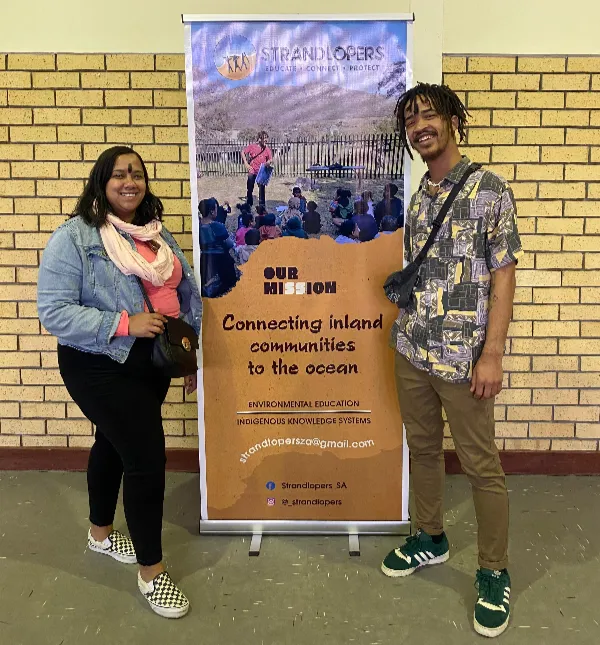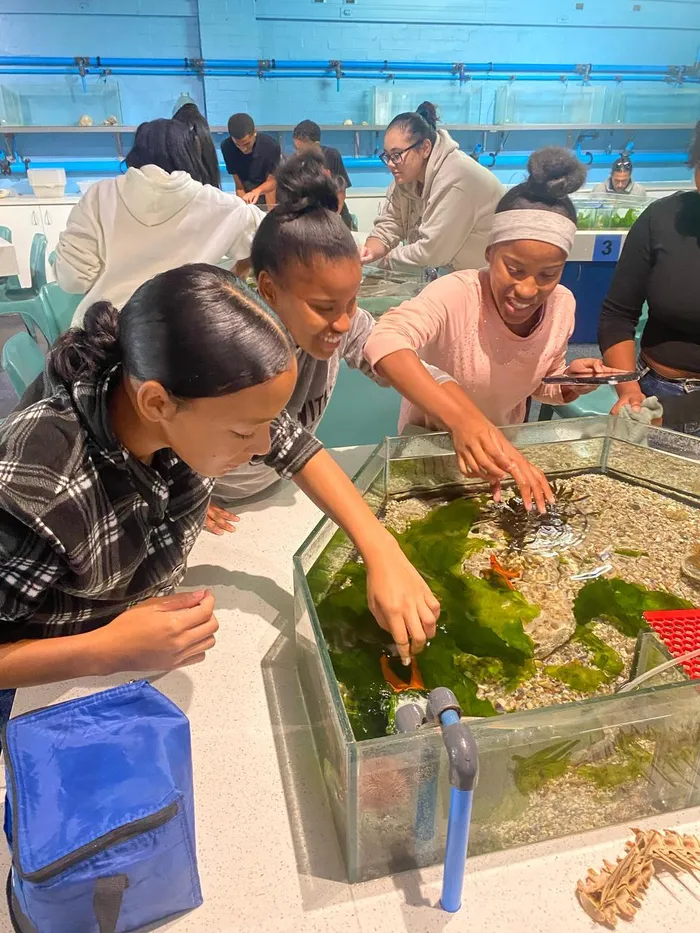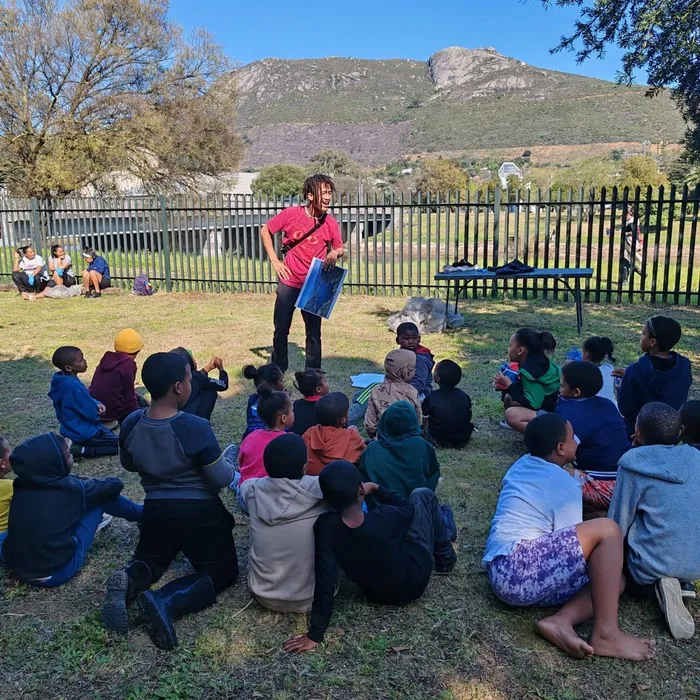Paarl youth making waves in marine conservation with Jonk Strandlopers
Youth-led non-profit organisation Standlopers in Paarl is connecting children from inland communities to the ocean.
Founded by marine science graduates Wade Naudé and Ciley Sampson from Paarl, the organisation was established to make environmental action and marine conservation more accessible to children from local neighbourhoods.
While Paarl is an inland town, the duo has managed to demonstrate the importance of marine conservation to Paarl youth.
“We’ve developed lessons that trace the Berg River’s journey from its source, through the towns it passes, to its mouth in the Atlantic Ocean.
“This helps participants understand how their inland actions can directly impact the ocean.
“We emphasise that much of the plastic in the ocean originates from land via rivers and runoff, and that inland communities benefit daily from the ocean through oxygen, water, food, and livelihoods, even if the coastline is far away,” Mr Naudé said.
Through their organisation’s Jonk Strandlopers programme, Mr Naudé and Ms Sampson are empowering youths from Magnolia Flats, Amstelhof, Lantana, Mbekweni, Chicago, Smartytown, Groenheuwel, Lemoenkloof, and Charlston Hill communities.
Mr Naudé grew up in the Magnolia Flats community and now lives in Plumstead, while Ms Sampson lives in New Orleans in Paarl.

From left, Ciley Sampson and Wade Naudé are the founders of Strandlopers, a youth-led marine conservation and environmental education organisation in Paarl.
Image: Supplied
While studying marine science, he experienced several challenges coming from an inland community, Mr Naudé said.
“Jonk Strandlopers grew out of a series of clean-up activities along the Berg River that began in 2020.
“At the time, my journey into marine science had been shaped by the challenges I faced as a student from an inland community.
“Before enrolling in marine science, I had never heard of the course. During my studies, the distance and financial constraints made it difficult to join beach clean-ups or volunteer regularly.
"Starting clean-ups locally was a way to make environmental action accessible," he said.
Mr Naudé said the organisation and its Jonk Strandlopers programme, in particular, have grown in leaps and bounds since it was established during COVID-19.
“Over time, our work expanded through partnerships with local municipalities, clubs, and organisations, allowing us to reach more people.
“In 2023, we partnered with Cape Winelands Biosphere, which provided transport for learners from Paarl to the Save Our Seas Foundation Shark Education Centre in Kalk Bay in Cape Town.
“We later got to introduce an education component to our clean-up events.
“In 2024, we hosted our first dedicated educational session with Grade 6 learners from Paarl, and later that year, we secured funding to launch our youth-focused programme for 2025, officially named Jonk Strandlopers,” he said.
“We also organise one large annual public clean-up along the Berg River to encourage wider community participation,” he added.
In the past year, the organisation has engaged more than 500 people through clean-ups, educational sessions, and school outreaches.
“This is an achievement that we are proud of, given our small team and limited funding,” Mr Naudé said.

Seen here, youth girls from Paarl explore the marine life at the Two Oceans Aquarium at the V&A Waterfront in Cape Town during a Jonk Strandlopers educational excursion.
Image: Supplied
The Jonk Strandlopers programme runs twice a month on Saturdays, from March to September. Sessions last for about two hours, depending on the day’s activities.
Mr Naudé and Ms Simpson have developed the programme curriculum and co-led educational sessions, engaged stakeholders, and forged partnerships to bring their marine education projects to life.
“The Jonk Strandlopers programme teaches youth about the interconnectedness of water systems, the significance of the Fynbos biome, indigenous knowledge systems, and the relationship between indigenous people and nature – past, present, and future,” he said.
The organisation also introduces participants to career opportunities in marine science and conservation. Activities range from classroom-style lessons and guest speaker sessions to clean-ups, hikes, and excursions.
While the Jonk Strandlopers programme is open to all, it especially focuses on under-resourced communities where access to educational and environmental opportunities may be limited.
“We aim to ensure that youth who might not otherwise encounter marine or conservation topics have the chance to learn, explore, and participate.
“We also encourage them to share their learning with peers and their communities, acting as a bridge between education, conservation, and cultural heritage.
“Thanks to our funders, Nature Connect and the Table Mountain Fund, the programme is offered free of charge,” Mr Naudé said.

Seen here, Wade Naudé, co-founder of Strandlopers, a youth-led marine conservation organisation, facilitates an educational session with children from under-resourced Paarl communities.
Image: Supplied
Ms Sampson said Jonk Strandlopers is everything she wished she had while at school.
“Growing up as someone who loved nature but wasn’t sporty often left me feeling out of place.
“There were no clubs for kids like me. That’s why Jonk Strandlopers holds such a special place in my heart.
“It’s about curiosity, learning, and a deep respect for nature,” she said.
Ms Sampson said nurturing this curiosity and respect for nature among the youth keeps her motivated.
“What keeps me motivated are the kids, the spark in their eyes when they discover something new, their excitement on excursions, and those small moments of connection. Every week, I know we’re planting seeds for a more mindful, caring future.
Apart from its marine conservation activities, Strandlopers organisation’s social impact has also been realised through its efforts to promote cultural heritage.
It recently hosted its first heritage-focused event, which brought together historians, artists, poets, indigenous leaders, teachers, and conservation organisations.
The event included an address from a local chief of the Hawequa |Xam tribe, a historian’s research into the story of Krotoa, an artist’s reimagining of her image based on historical accounts, and a poet’s reflections on language and identity.
Two Jonk Strandlopers youths shared their journeys at the event, speaking about how the programme built their knowledge, boosted their confidence, and helped them overcome a fear of public speaking. Teachers expressed interest in bringing similar opportunities to their history learners, while parents voiced their desire to be more involved.
“On a personal level, one mother shared how her son had begun testing water at home after participating in our mini-SASS (South African scoring system) water-testing session, and how his new knowledge had influenced her as well.
“These stories show that our work goes beyond environmental education; it empowers learners, strengthens community ties, and revives cultural heritage,” Mr Naudé added.
For more information or to get involved, WhatsApp Wade Naudé on 067 107 3372 and Ciley Sampson on 083 948 4602 or email strandlopersza@gmail.com, or follow Strandlopers on Instagram and Facebook.